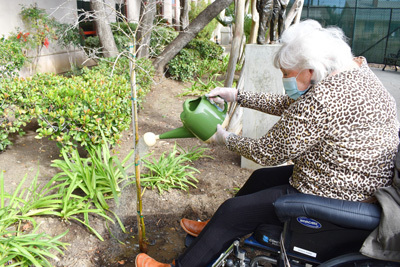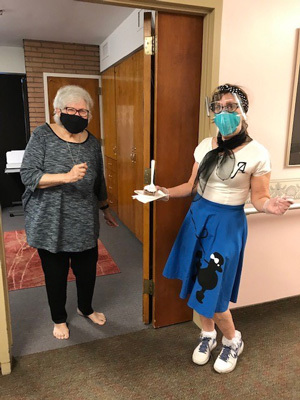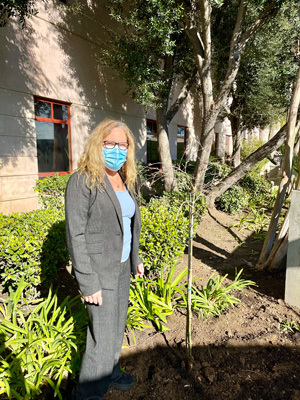Days Filled with Fun at the Los Angeles Jewish Home


Days Filled with Fun at the Los Angeles Jewish Home
For their own health and safety, for approximately a year now, residents of the Los Angeles Jewish Home have not been able to venture far, or even welcome visits from family members, due to the ongoing COVID-19 pandemic. Yet, despite the required restrictions, activities staff and others have continued to work hard identifying safe ways to fill the days with lighthearted fun. As residents wait for the day they can all be together again, they have access to a broad range of activities to keep themselves engaged and entertained.

"Helping our seniors stay active has been so critical throughout this past year," says Annette Weinberg, lifestyle and enrichment director for residential care, "so we've made sure to keep their calendars full. My goal is to have enough activities planned that, if they're so inclined, our residents can be occupied all day long."
Annette has been working tirelessly to reach that goal, and the packed Jewish Home schedule of events is a testament to her success. For instance, every morning, residents can tune into the Home's in-house television channel for a therapeutic chair exercise class. Once they have warmed up with a workout, the pace of the day accelerates from there.
One of Annette's most popular programs is the biweekly Nosh and Nibble, which incorporates costumes, music and food around a central theme. "Our most recent theme was 'Twist and Shout,'" she says. "Director of Volunteer Services Stacy Orbach, Lifestyle and Enrichment Assistant Sandy Schipper and I dressed up in 1950s attire —like poodle skirts and pink bomber jackets—and walked the hallways with a big boombox playing fun music of the 50's and giving out snacks. Of course, everyone is masked and physically distanced, but the idea is that residents can come to the doorways and enjoy a little levity. It's an incredibly uplifting event for us as well as for them."
Phone-in activities also draw large numbers of residents. From Dial-a-Bingo to word games, to trivia contests, residents can participate in fun games and community building exercises from the safety of their own rooms. "One activity that always attracts a lot of our seniors is something I call ‘Today in History,' where I come up with 20 or 30 different things that happened on the same day but in different years, and we all discuss it," Annette says. "We also hear a great deal of positive response from ‘Hello Out There with Katie and Annette,' which is an informal, call-in support group for residents to share their feelings and know they are surrounded by people who care. My co-host for that is Katie Abelson, who is director of resident care services and a licensed social worker. We choose a new topic for each episode; our most recent one was, ‘Love is in the air. Do you feel it?'"

This winter, the Home launched a journal writing class, helping residents find their inner author. "I'm really excited about it because it's something so different from the other activities we offer. It's an eight-week class, with a syllabus and a new topic every week," Annette says. The course allows for a broad diversity of creative expression. "Some of our residents are doing it because they want to track their diet, food or exercise; others are keeping dream journals or writing more of a straight diary. Whatever their motivation, it's super fun; I'm actually doing it, too!"
Many residents look forward to movies being broadcast daily on the TVs in their rooms. They also eagerly anticipate Friday evenings, when they can tune into Shabbat services led by Skirball Director of Spiritual Life Rabbi Karen Bender and Eisenberg Village Rabbi Ronald Goldberg.
"Residents enjoy the services' songs and prayers, exploring thought-provoking ideas with us," Rabbi Bender says. "One week, we might discuss the book of Exodus —in Hebrew that's ‘Shemot,' which means ‘names'—delving into why names matter; the next, we might engage residents in thinking about their favorite Jewish ritual or holiday."
Rabbis Bender and Goldberg also lead residents in festive holiday celebrations, with activities that add depth of meaning to the daily schedule. For Tu B'shevat, also known as "the New Year of the Trees," Rabbi Bender planted a gorgeous Japanese maple in front of the Mark Taper Skilled Nursing Building at Grancell Village for residents to enjoy—and to help water and care for. At Eisenberg Village, Rabbi Goldberg planted a Blue Potato Bush tree in front of the Volunteer Office for residents to experience as well. For the upcoming holiday of Purim, the rabbis will air a special broadcast featuring a traditional megillah reading, and residents will receive hamantaschen, groggers and masks, delivered to their doors. "The personal delivery is a big part of what we do these days," Rabbi Bender says. "To offer human, one-on-one connections during these trying times is so important for our residents. Knowing we're here for them makes a really big difference in their outlook on life."

With all of these activities, Annette says, there is something for every Jewish Home resident. Central to her success has been her strategic approach to planning. "We have an activities committee, and I'm always soliciting their feedback about whether something is working," she says. "So if I keep offering a program, it's because I know they enjoy it!"
She also has other indications for making sure residents are having a good time. "I get lots of appreciative phone calls and notes from folks, which is wonderful," she says. "That tells me we're doing something right."